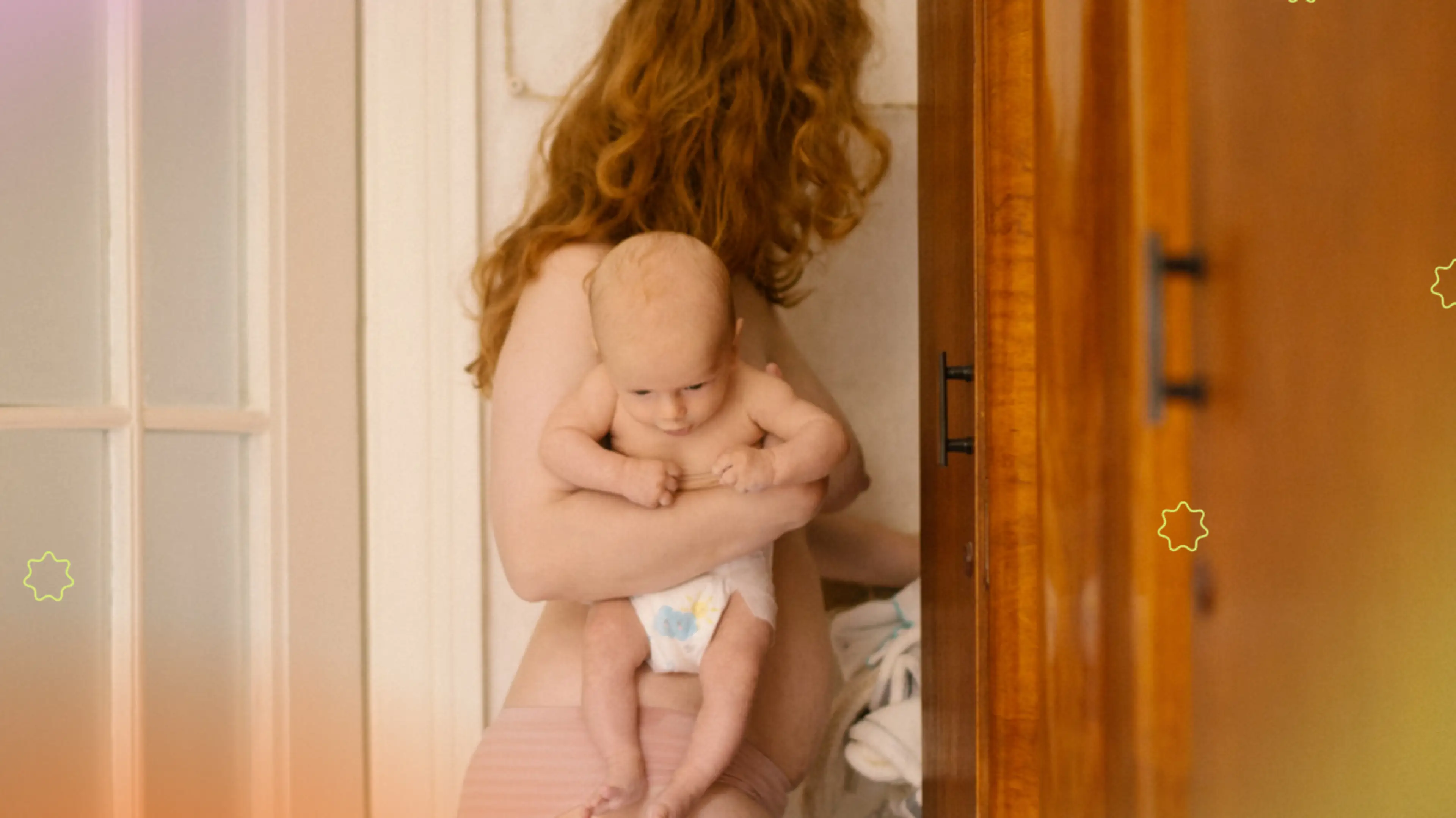We get it—having mom friends makes our lives better. They deeply understand what it’s like to step into the new motherhood stage of life in all its brutal and beautiful glory, and they aren’t afraid to talk about it. Just knowing that somebody else gets what you’re going through is reassuring and life-affirming. But what if you just don’t have anyone like that in your life?
One, this is not a “you” problem. We, as a society, are experiencing a loneliness epidemic1 that unfortunately hits new moms even harder. Two, just getting yourself out there and interacting with other people is a small step you can take that will give you an immediate oxytocin boost and eventually lead to deeper friendships. Here’s what mental health experts, friendship coaches, and moms who have been in your exact same shoes say you can do to get started.
Try Out Mother-Child Classes or Support Groups
Let’s start with the most obvious places to get out there and find your mom posse. You want to go where the other new moms are, which could be story time at the local library or a mommy and me yoga or music class. No matter what interests you, you can probably find a group for it that will let you bring your infant along.
When Dr. Emily Spaeth, 35, had her first child she was also teaching a postpartum and baby yoga class, which felt like a bonding experience. “I just find it to be the most nourishing thing, because you can actually move with your baby, and you can see other people struggling, or just nursing their baby for the whole class or changing their baby's diaper in the middle of class. So, just understanding that it's not pretty, but we're all still trying to move anyway is helpful,” she says. Her other tip? Try to find a support group that allows you to go before you have your baby to start meeting people earlier in your motherhood journey.
Social media-led stroller walking groups are also a pretty big thing since COVID, says Tania Beaudoin, a perinatal mental health therapist. “There are no requirements, there’s no payment, and it’s just an easy way to get into your community, get out and meet other people, which is great, because they’re likely to live within a 15-minute radius.”
Then you find like-minded people in these bigger groups, you’ll naturally start to bond with them, says Danielle Bayard Jackson, a friendship educator and mom to two kids. “Other people with the same lifestyle naturally splinter off from the larger groups and form more intimate friendships—and so it starts by being in community, and then it leads to friendships,” she says.
Give Yourself Grace and Know It’s Okay to be Late
If you’re newly postpartum and it feels impossible to get out of the house to even go to a support group, go anyway, even if you’re 45 minutes late, says Spaeth. “It’s one of the most admirable things you can do when you show up to an event with a group of people you’ve never met, so give yourself so much grace,” she says. “And be late! It doesn't matter if you show up for the last five minutes—being there and being vulnerable and honest with the amount of support that you need is so beautiful, and so admirable, and so important.”
A Formal Group Might Lead to Informal Connections
Another place you can try is a postpartum support group that’s led by your local hospital, says Dr. Alexis Menken, a perinatal mental health psychologist. While these are typically more formal support groups, they can lead to informal connections once you start going regularly.
Ashley Fields, 35, started with a breastfeeding support group through the hospital where she gave birth. “I was very early postpartum, my hormones and emotions were all over the place, and I just remember thinking, ‘I don't know what I'm doing and don't necessarily want to go here and look like I don't know what I'm doing.’” she says. “But also, ‘This is where I was told by the hospital and my lactation consultant that I can get some support. So we're just gonna see.’
Approaching it with an open mind helped her to shed those insecurities, and when she did, it was eye-opening. “I was able to see people in various stages, like there were moms in the same stage postpartum and moms that were much further along, all figuring it out. And being able to just see that they were real humans struggling in different stages or finding success in different stages was really helpful to me.”
From there she was able to start making social connections that turned into something more. ”Having a good formal support system helped me to develop some of the informal support systems,” she says.
Technology Is Your Friend
Of course, the goal is to make meaningful in-person connections, but there are ways to do this from the comfort of your own phone. There are lots of apps designed specifically for moms to say, ‘I live in this area and I have young kids,” to help you meet other people in your area, says Bayard Jackson. Apps like Peanut and MomsBeyond are good places to start. “Using those apps does not make you desperate, that makes you resourceful,” she says.
Online communities can also serve another purpose, particularly for us introverted moms, says Beaudoin. “If you are someone who happens to be a bit more shy or nervous, sometimes just being a lurker can make you feel more connected,” she says. “Joining a community Instagram group can be helpful. Just to read through the comments can be beneficial, because you might feel like, ‘Okay, I'm in this circle even without leaving my house just yet. I'm plugged in a little bit,’” she says.
Another great resource is Postpartum Support International2 , who offers support groups for just about every niche and individual out there.
Consider Signing Up for a Paid Mom Community
If you’re looking for more structured support, and you have the means, there are also paid mom support communities that can help you connect and provide you with expert information, says Dr. Danielle Wright-Terrell, an ob-gyn, mom, and business owner. In fact, she started her company, Honey, to help new moms get this support. “We offer that peer-to-peer support with the oversight of health experts like myself, an ob-gyn, but also parenting coaches, sleep coaches, lactation consultants, dietitians, so if you have specific questions, someone who has expertise in that particular area can answer it,” she says.
You can also find local-in-person groups with a similar idea, says Spaeth, who charges $10 for her support group, and uses that to bring in expert speakers. “We talk about sex after birth, or we talk about communication with your partner or your baby's sensory system, and there's always something that might spark questions or answer questions that you didn't even know you had,” she says.
Talk to Other Parents at Your Daycare or Nanny Share
Doing a nanny-share is a great way to make a meaningful friendship with another family. Your kids will naturally become friends, and that will give you an in to chat at drop-off or send a silly text after an in-person conversation.
“When it was time for me to go back to work after having my first child, I sought out a shared nanny situation with a neighbor so that my son would have company and learn social skills—but also so I would have a mom close by to ask advice from. This mom happened to have three kids, was very knowledgeable and gave me all the tips and tricks,” she says.
Daycare is another way to find new friends, says Lauren Gregor. “At drop-off or pick-up time, you have to be brave enough to ask parents to do a playdate, even though the babies are little, but just trying to build those connections,” she says. “It’s scary, it feels like dating.”
Literally, Just Say Hi to People
If you’re at the playground and your kid starts cooing at the other baby in the swing, say hi to the other parent monotonously pushing the swing, too! That’s how Abbey Sangmeister, 42, went about building up her mom circle. “Just go places that you like to go with your child, like the playground or gymnastics when they have an open gym,” she says. “If you go consistently and say ‘hi’ to the people you see there, that’s going to open the door for them to reach out to you,” she says.
And Just Text the Group and See What Happens
When the teacher for Sangmeister’s daughter’s baby swim class sent out a group text to all the parents, she decided to take a chance. “I was like, I’m just going to respond to everyone who didn’t have class and say, ‘who wants to meet at the playground?’”
Getting over her initial anxiety about sending the text paid off. “All the other moms were so thankful because nobody else had thought to do that,” she says.
Not Everybody Has to Become Your Best Friend
Remember when building these friendships, they don’t all have to be the deepest relationships of your life. “Sometimes it clicks and sometimes it doesn't,” says Dr. Menken. “It serves other purposes in their lives, but it's not about finding a best friend.”
For example, when Fields was going to her breastfeeding group, she became close with several of the women she met there. “As I’ve needed less support with breastfeeding, we’ve naturally gone our separate ways,” she says.
“These might be friends that you have for a season,” says Beaudoin. “They might not share everything in common with you or have the same values and beliefs, but they are great for this moment of your life, and that’s okay.”
Prioritize Connection Over Friendship
This next tip is going to blow your mind, I promise. If you have a habit of building up the “I need mom friends now!” mantra in your head, it can start to feel pretty overwhelming. You might even carry that anxiety into your everyday interactions with potential mom buds. Instead, says Bayard Jackson, reframe how you approach making friends. “Have one meaningful social interaction everyday, because friendship becomes a natural byproduct of that.”
Standing in line at Target with your baby? Ask the checkout clerk if their day has been busy, says Bayard Jackson. “Having a little laughter or human connection with a stranger is truly proven to boost our mood,” she says.
And don’t be afraid to bond by asking questions. Like if you see a mom sitting at the park, you could ask, “Oh, which one is your baby?” or “Our babies seem to be the same age—how are you handling teething?” or “Where is your daughter’s outfit from?” You’re curious about the person, but you’re not putting pressure on the interaction to turn her into a friend, says Bayard Jackson. “Maybe this is just a really nice conversation on a Tuesday afternoon.”
Be Okay With Having Some Awkward Conversations
The longer you stay holed up in your house, the harder it will be to get back out there and be social again, says Bayard Jackson. “It can build up to be very scary, and yeah, it will be clunky, but give yourself permission to let the conversation be awkward,” she says. “We underestimate the complexity of conversation—this is a person you don’t know and you’re trying to gauge what’s appropriate, what’s comfortable, you’re trying to think of things to say,” she says.
Also, you don’t need to convince this person that you're smart or funny or cool (duh, you are), just be curious. “It changes the tone and takes the spotlight off of you,” she says.
Try Not to Internalize the Awkwardness
Deep breath, there will be times that you feel like you failed at the whole friend thing, but that doesn’t define you. The question becomes, how resilient are you? How do you cope when things are awkward and you feel rejected? “We’re not internalizing it, we’re moving on,” says Bayard Jackson. “Are you allowing your fear of awkwardness and rejection to completely immobilize you or are you leaning into this journey, knowing that it’s going to happen, and just rolling with it anyway?”
The more times you put yourself out there, the better your chances of making connections, says Beaudoin. “It’s sort of a numbers game, like dating,” she says. “We don’t just say, ‘Oh, I guess it didn’t work out, so I’ll just stay home,’ we have to go out again and try again.”
Be Strategic About How Long You Hang Out With Someone
This tip is especially for the introverted moms out there (*raises hand) and it’s all about protecting your time. When you suggest a playdate or a mom hang, people usually don’t give a time limit, says Bayard Jackson. But, being really clear about how long you’re asking to hang out not only helps you to mentally grapple with the amount of social energy you’ll need to expend, but it also makes people more likely to agree to meet up.
You can say, “Hey, do you want to get together and walk at the park for an hour or so around nine on Saturday? Let’s just catch up for a bit,” says Bayard Jackson. “I’m telling them for an hour, and it helps them realize they can commit to an hour, rather than a full morning.”
…And When You Hang Out
Another Tip? Try having a set day for something to do. Gregor, a mom to two boys, was introduced to a local peer support group by her doctor after she found herself in a completely new city after having her second child. “At least on Saturdays I had something to look forward to, something on the calendar, like, we're going to meet for coffee,” she says. “Once I started to get outside this small space where everybody's really isolated, it just opened my world up.”
Successfully getting out of the house with her two kids gave her confidence to try bigger outings. “When I finally did get up the courage to go out to this beach outing, it was an all day thing. And it was just me, and I brought my toddler and my baby. And I remember on the bus on the way back my youngest could not stop crying, like wailing wailing and wailing, and I just started crying on the bus.”
“Then, one of the other moms from the peer group came over and picked up my baby and took him to the back of the bus with her, and said, ‘Don't worry. I’ve got it,’ says Gregor. “You don't realize how much you need that.”
Only Spend Time on People You Actually Like
If you went to the mommy mixer and you just didn’t hit it off with anyone, it’s fine to try a few times. But if you’re still just not vibing with that group, don’t waste your time and energy forcing something that isn’t a good fit.
“It seems obvious, but make sure you’re hanging out with people you actually like, and if you’re not enjoying it, and actually dreading it, you don’t need to pretend,” says Bayard Jackson.
You might also want to take some time and space to reflect on how you’re feeling after a gathering, says Fields, who asks herself, “How did that feel? What did I learn from the experience?” If you then realize it didn’t work for you, you can redirect your energy towards looking for something different, she says.
Lean In to Being a Connector
We all know that introverts need time to recharge alone, but it can also be tiring if you’re the resident extrovert who always seems to be the one making plans for the group. “Stay motivated knowing that you’re the connector, because if you adopt it as a noun instead of a verb, it becomes part of our identity instead of something we’re doing,” says Bayard Jackson. “So, reaching out and following up is an extension of your identity, so you’re not going to play games like, ‘Oh maybe it’s too much to reach out,’” she says. “If I know that we enjoyed the initial conversation and I trust my gut that it seemed like we connected, then I’m going to reach out, because that’s what I do.”
And, if you find yourself on the receiving end of a connector, take advantage of that, says Fields. “If you have somebody in your community who is a natural connector, let them do the connecting for you so that you don’t have to do all the work yourself.”
Show Your Potential Bestie What It’s Like to Be Your Friend
You want to try to leave a positive emotional impression on other people and keep you top of mind, says Bayard Jackson. If during your conversation your new friend mentioned that she likes gardening, two days later you could text her a link to a podcast about gardening that you enjoyed.
Then, once you’ve been going back and forth texting—offering value, resource sharing, inside jokes, whatever—the next natural step is to get together. “You can invite her to a coffee shop you talked about, so it’s not random or a big ask coming out of nowhere,” she says. “We really need to unapologetically pursue active friendships.”
It May Take Time to Build Your Community of Mom Friends
If you’re starting from square one, know that it takes time to build friendships. It’s not an overnight thing. “It took a while, probably a good year,” says Gregor. “Maybe you go meet with one mom one week, and then you try to reconnect, but it takes another week or month after that,” she says. So, if things don’t feel like they’re moving along fast enough, just keep putting yourself out there. Eventually, you’ll look back and realize you do have a few people you can call.
Consider Talking to a Therapist
If you are really struggling to make friends, and it’s affecting your mental health, there is no shame in talking with a therapist. They can fill your cup in a different way, says Dr. Lilit Ayrapetyan, 41, a therapist and mom. “Getting individual therapy helps, too, because you have that special hour to yourself that you might not otherwise get throughout the entire day.”
Pay Your Friendship Forward
Once you are out of that first very intense year of new parenthood, you can pass on all your wisdom and empathy to other moms who are just beginning their mom era. “I will now try to help my friends when I see that they are struggling,” says Jenny Zimmer, 34.
A few weeks ago, Zimmer's friend was in the thick of new parenthood with her third child, so she invited her friend and the baby to come stay at her place for the weekend. “She was in tears, living on no sleep, a working mom with no maternity leave, and she needed someone who understood,” she says. “I took care of her son for three nights in a row while she got some much needed rest. That's what mom friends are for.”
Read Next: Here’s Why Having Mom Friends Is So Important for Your Mental Health












